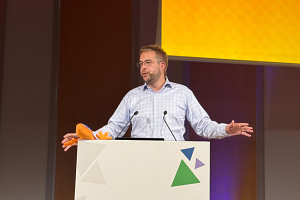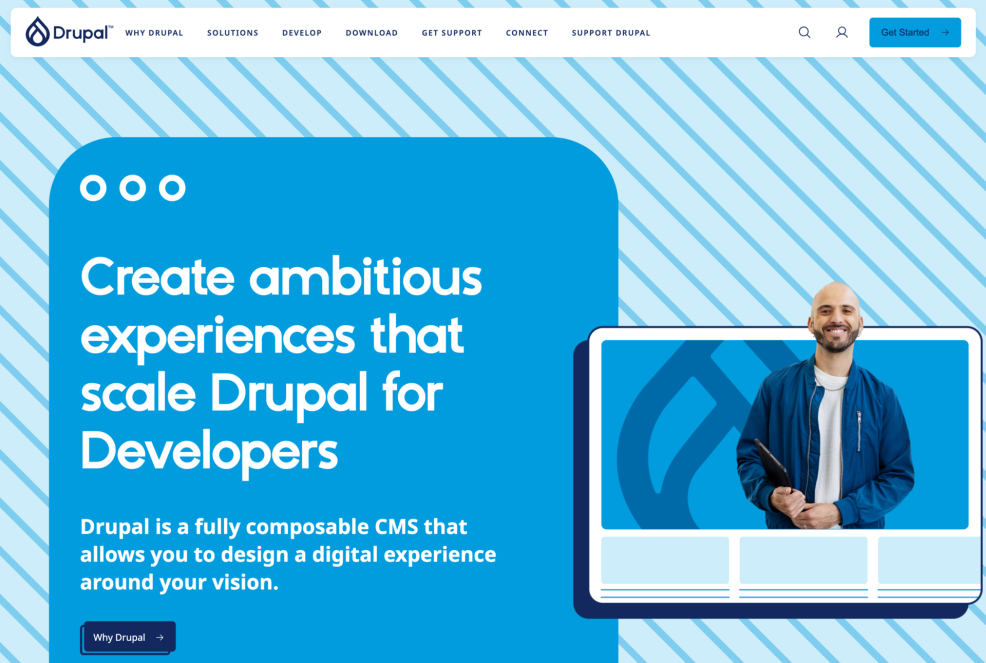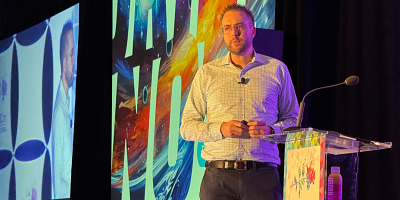
DrupalCon Barcelona 2024: State of Drupal

Approximately 1,100 Drupal enthusiasts gathered in Barcelona, Spain, this week for DrupalCon Europe. As per tradition, I delivered my State of Drupal keynote, often referred to as the "DriesNote".
If you missed it, you can watch the video or download my slides (177 MB).
In my keynote, I gave an update on Drupal Starshot, an ambitious initiative we launched at DrupalCon Portland 2024. Originally called Drupal Starshot, inspired by President Kennedy's Moonshot challenge, the product is now officially named Drupal CMS.
The goal of Drupal CMS is to set the standard for no-code website building. It will allow non-technical users, like marketers, content creators, and site builders, to create digital experiences with ease, without compromising on the power and flexibility that Drupal is known for.
A four-month progress report

While Kennedy gave NASA eight years, I set a goal to deliver the first version of Drupal CMS in just eight months. It's been four months since DrupalCon Portland, which means we're halfway through.
So in my keynote, I shared our progress and gave a 35-minute demo of what we've built so far. The demo highlights how a fictional marketer, Sarah, can build a powerful website in just hours with minimal help from a developer. Along her journey, I showcased the following key innovations:
- A new brand for a new market: A brand refresh of Drupal.org, designed to appeal to both marketers and developers. The first pages are ready and available for preview at new.drupal.org, with more pages launching in the coming months.
- A trial experience: A trial experience that lets you try Drupal CMS with a single click, eliminating long-standing adoption barriers for new users. Built with WebAssembly, it runs entirely in the browser – no servers to install or manage.
- An improved installer: An installer that lets users install recipes – pre-built features that combine modules, configuration, and default content for common website needs. Recipes bundle years of expertise into repeatable, shareable solutions.
- Events recipe: A simple events website that used to take an experienced developer a day to build can now be created in just a few clicks by non-developers.
- Project Browser support for recipes: Users can now browse the Drupal CMS recipes in the Project Browser, and install them in seconds.
- First page of documentation: New documentation created specifically for end users. Clear, effective documentation is key to Drupal CMS's success, so we began by writing a single page as a model for the quality and style we aim to achieve.
- AI for site building: AI agents capable of creating content types, configuring fields, building Views, forms, and more. These agents will transform how people build and manage websites with Drupal.
- Responsible AI policy: To ensure responsible AI development, we've created a Responsible AI policy. I'll share more details in an upcoming blog, but the policy focuses on four key principles: human-in-the-loop, transparency, swappable large language models (LLMs), and clear guidance.
- SEO Recipe: Combines and configures all the essential Drupal modules to optimize a Drupal site for search engines.
- 14 recipes in development: In addition to the Events and SEO recipes, 12 more are in development with the help of our Drupal Certified Partners. Each Drupal CMS recipe addresses a common marketing use case outlined in our product strategy. We showcased both the process and progress during the Initiative Lead Keynote for some of the tracks. After DrupalCon, we'll begin developing even more recipes and invite additional contributors to join the effort.
- AI-assisted content migration: AI will crawl your source website and handle complex tasks like mapping unstructured HTML to structured Drupal content types in your destination site, making migrations faster and easier. This could be a game-changer for website migrations.
- Experience Builder: An early preview of a brand new, out-of-the-box tool for content creators and designers, offering layout design, page building, basic theming and content editing tools. This is the first time I've showcased our progress on stage at a DrupalCon.
- Future-proof admin UI with React: Our strategy for modernizing Drupal's backend UI with React.
- The "Adopt-a-Document" initiative: A strategy and funding model for creating comprehensive documentation for Drupal CMS. If successful, I'm hopeful we can expand this model to other areas of Drupal. For more details, please read the announcement on drupal.org.
- Global Documentation Lead: The Drupal Association's commitment to hire a dedicated Documentation Lead, responsible for managing all aspects of Drupal's documentation, beyond just Drupal CMS.
The feedback on my presentation has been incredible, both online and in-person. The room was buzzing with energy and positivity! I highly recommend watching the recording.
Attendees were especially excited about the AI capabilities, Experience Builder, and recipes. I share their enthusiasm as these capabilities are transformative for Drupal.
Many of these features are designed with non-developers in mind. Our goal is to broaden Drupal's reach beyond its traditional user base and reach more people than ever before.
Release schedule
Our launch plan targets Drupal CMS's release on Drupal's upcoming birthday: January 15, 2025. It's also just a couple of weeks after the Drupal 7 End of Life, marking the end of one era and the beginning of another.
The next milestone is DrupalCon Singapore, taking place from December 9–11, 2024, less than 3 months away. We hope to have a release candidate ready by then.
Now that we're back from DrupalCon and have key milestone dates set, there is a lot to coordinate and plan in the coming weeks, so stay tuned for updates.
Call for contribution
Ambitious? Yes. But achievable if we work together. That's why I'm calling on all of you to get involved with Drupal CMS. Whether it's building recipes, enhancing the Experience Builder, creating AI agents, writing tests, improving documentation, or conducting usability testing – there are countless ways to contribute and make a difference. If you're ready to get involved, visit https://drupal.org/starshot to learn how to get started.
Thank you
This effort has involved so many people that I can't name them all, but I want to give a huge thank you to the Drupal CMS Leadership Team, who I've been working with closely every week: Cristina Chumillas (Lullabot), Gábor Hojtsy (Acquia), Lenny Moskalyk (Drupal Association), Pamela Barone (Technocrat), Suzanne Dergacheva (Evolving Web), and Tim Plunkett (Acquia).
A special shoutout goes to the demo team we assembled for my presentation: Adam Hoenich (Acquia), Amber Matz (Drupalize.me), Ash Sullivan (Acquia), Jamie Abrahams (FreelyGive), Jim Birch (Kanopi), Joe Shindelar (Drupalize.me), John Doyle (Digital Polygon), Lauri Timmanee (Acquia), Marcus Johansson (FreelyGive), Martin Anderson-Clutz (Acquia), Matt Glaman (Acquia), Matthew Grasmick (Acquia), Michael Donovan (Acquia), Tiffany Farriss (Palantir.net), and Tim Lehnen (Drupal Association).
I also want to thank the Drupal CMS track leads and contributors for their development work. Additionally, I'd like to recognize the Drupal Core Committers, Drupal Association staff, Drupal Association Board of Directors, and Certified Drupal Partners for continued support and leadership. There are so many people and organizations whose contributions deserve recognition that I can't list everyone individually, partly to avoid the risk of overlooking anyone. Please know your efforts are deeply appreciated.
Lastly, thank you to everyone who helped make DrupalCon Barcelona a success. It was excellent!
This blog was originally published on Dri.es.


